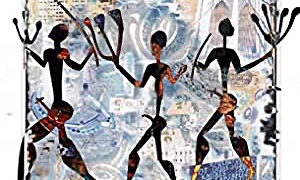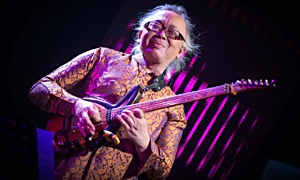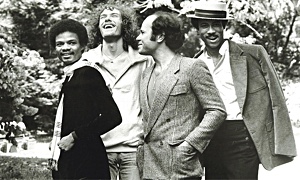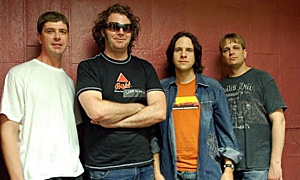Home » Jazz Articles » BackTracks » Ethnic Embraces
Ethnic Embraces
 Nguyên Lê
Nguyên Lê Maghreb And Friends
Act Music
1998
It's fairly obvious to say but French/Vietnamese guitarist Nguyen Le is something of an embodiment of the cross- cultural music he makes. After a stint with the French fusion band Ultramarine—quite the multicultural affair itself—Le embarked on a solo career in the '90s, releasing a series of three fine, relatively straight-forward fusion albums. It was on his fourth, Tales From Vietnam (ACT, 1996) that he not only began a musical exploration of his personal ethnic roots, but started down the path of a pan- ethnicism that would color his output to varying degrees thereafter.
The first apex of these explorations is 1998's Maghreb And Friends. In it, Le incorporates his modern electric jazz with the North African musical traditions of The Maghreb as well as those of his ancestral Vietnam. In this endeavor, Lê is amply aided by a mixed cast—about half composed of musicians from North Africa (most conspicuously Algerian drummer/multi-instrumentalist Karim Ziad), the rest made up of musicians from places as culturally disparate as Italy, Serbia, France, Austria and Vietnam.
The resulting music is a wonder, not least for the great use of its talented assemblage, but also for its marshalling of all these influences into an amazingly blended, yet cogent vision. Maghreb And Friends is perhaps the benchmark that qualifies Lê as one of the foremost bearers of the electric world/jazz mantle into a post-Zawinul age.
 Karim Ziad
Karim Ziad Ifrikya
ACT Music
2001
It would be nearly impossible (and unfair) to mention Maghreb and Friends without talking about Karim Ziad's Ifrikya. Released three years after the initial project with Lê , Ziad's album is definitely a companion piece of sorts to Lê 's, often employing many of the same musicians from the Maghreb And Friends sessions (including Lê himself). But despite the commonalities in personnel and the aims of its stylistic thrust, Ifrikya is a different animal. While still a fusion of North African music with electric jazz, it's not a complete surprise that with Ziad helming the proceedings, Ifrikya drives substantially deeper into the music's Algerian heart, while re-interpreting it in ways no less fiery, modern or innovative. The two albums are inseparable, yet each is equally brilliant in its own right.
 Carles Benavent
Carles Benavent Quartet
Bebyne Records
2009
Aside from the irrepressibility of its flamenco heart, there are a couple of remarkable things that stand out when listening to Carles Benavent's Quartet. The first is his bass sound and technique, which he first started honing famously as a longtime member of the late Paco de Lucia's groundbreaking ensemble. Benavent's chordal approach to bass and use of a pick has evolved into an unmistakable and indispensable voice in the eventually realized idiom of flamenco/jazz. It's uniqueness wields an authenticity looming enough to put flamenco purists/critics in their places (and perhaps should even win them over as converts).
The other is how well this group works together. This is true on stylistic and technical level, seeing as a bassist of Benavent's range and role requires a special group simpatico, but even more so on a purely sonic level as the combination of instruments on Quartet produces something aurally extraordinary. Benavent's unique bass sound plus Ravid Goldshmitt's bell-like tones on hang, (a tuned percussion instrument), do evoke a slightly more refined variant of Jaco Pastorius' oft pairings with steel drums, but the addition of the signature, sometimes reverse-enveloped guitar tone of Jordi Bonell and Roger Blàvia's spacious drumming creates a sonority that can best be described as uniquely delicious.
 Louis Winsberg
Louis Winsberg Jaleo
Universal Music France
2001
Another notable album of hybridized flamenco/jazz is Jaleo by French guitarist Louis Winsberg. A longtime member of the seminal French fusion band Sixun, Winsberg's latent flamenco obsessions were seeded at a young age by his father. In 2001, those obsessions were made manifest by this project, which not only combines a few modern additions (electric guitar, electric sitar, synths) with the traditional flamenco instrumentation (guitars, cajon, voice, palmas, dance), but also some instruments tied to flamenco's older historical lineage (saz, indian tabla). The resulting ensemble wonderfully accommodates the scope of Winsberg's playing and compositions in ways that go deeper into a tradition at times, while building upon it (and nicely exploding it a bit) at others.
 Brad Shepik and the Commuters
Brad Shepik and the Commuters The Loan
Songlines Recordings
1997
The Loan was the first of two Brad Shepik albums that would be somewhat emblematic of the ethno-jazz mini- movement that took root in the downtown scene of NYC in the late '90s/early 2000s. While it's follow-up The Well (Songlines Recordings, 2000) may be the slightly stronger sibling—with its more impactful distillation of Shepik's ethno-jazz vision—The Loan's charms reveal themselves largely in retrospect as a record of looser, more freshly-inspired cross-cultural exploration. Where The Well ended up emphasizing the Balkan, The Loan was a bit more egalitarian in scope, with more of the Persian and Turkish influence added (see the mesmerising cut "The Seeress") but also offered up a few moments so stylistically well- combined, they became something else altogether (see the sublime "The Water's Thirst").
The album features the soon-to-be-familiar names of drummer Kenny Wollesen and bassist Tony Scherr (who would go on to be in a few of guitarist Bill Frisell's more well-known configurations), but also includes the initial pairing of Shepik with saxophonist Peter Epstein—with whom Shepik would have a fruitful partnership for a string of albums. All things work together astonishingly well here making The Loan a fine album as well as a harbinger of more great things to come from Shepik.
 New York Gypsy All-Stars
New York Gypsy All-Stars Romantech
Traditional Crossroads
2011
Imagine a club with forward-thinking, modernly-inclusive jazz across the street from a raucous Greek/Balkan wedding reception. Now imagine them both opening their doors and the music and patrons spilling out into the NYC street and partying together. That might be a fair description of what you hear (and feel) on the New York Gypsy All-Stars' Romantech.
A fair description perhaps, but far from an adequate one for it's difficult to convey how addictive this music can become once heard. This is largely due to the group applying their obscene amount of technical facility to its unique musical amalgam in the perfect measure. This amplifies the infectious joy and welcoming embrace of the music instead of sacrificing it. At once staggering and slightly exotic, familial and absolutely fun, it's an album best heard to be understood, for ultimately all descriptions fail to do justice to its indomitable spirit. It's also the next best thing to seeing the All Stars live—which is something that will most likely be on your wishlist after spinning Romantech.
Tracks and Personnel
Maghreb And FriendsTracks: Ifrikya; Constantine; Louanges; Yadik Allah; Nora; FunkRai; L'Arkha Li Jeya; Guinia; Nesraf.
Personnel: Nguyên Lê : electric and acoustic guitars, fretless bass, Vietnamese zither, programming; Karim Ziad: drums, gumbri, percussion, vocals; Michel Alibo: electric bass; Bojan Zulfikarpasic: acoustic piano; B'net Houariyat, Zahra Bani, Kadija Haliba, Malika Rhami, Saida Madrani, Halima Zaiter: vocals and percussion; Wolfgang Puschnig: alto sax; Paolo Fresu: trumpet; Alain Debiossat: soprano sax; Stefano Di Battista: alto and soprano sax; Mokhtar Samba: drums; Cheb Mami: accordion-synth; Djemai Abdenour: Mandola, Algerian banjo; Mejdoub Ftati: violin, Aziz Sahmaoui: vocals; Mohamed Menni: vocals, percussion; Mehdi Askeur: vocals; Huang Thanh: Vietnamese vocals; Hao Nhien: Vietnamese flute; Gaelle Herve: vocals; Marielle Herve: vocals; Jean Jaques Avenel: kora; Aly Wague: African Peul flute and vocals.
Ifrikya
Tracks: Ait Oumrar; Ya Rijal; Awra; Lebnia; Alouhid; Sandiya; Amaliya; Gwarir; The Joker; Nesrafet.
Personnel: Karim Ziad: lead vocals (2,4,5,7), drums, percussion, gumbri, guitar, mandola, background vocals; Abdelkbir Merchane: lead vocals (1,6,8); Hamid Mestari: lead vocals (3), background vocals, outar; Abdenour Djemai: banjo, mandola, background vocals; Menni Mohamed: percussion, background vocals; Khliff Miziallaoua: guitar, background vocals; Nguyên Lê : guitar (2,5); Bojan Zulfikarpasic: piano; Jean-Phillipe Rykiel: synthesizer solo (3,5); David Aubel: flute; Ali Wague: pehl flute; Linley Marthe: bass (except 2,3,4,6); Michel Alibo: bass (2,3,4); Alain Debiossat: soprano and tenor saxophone; Vincent Mascart: tenor saxophone; Gaelle Herve: background vocals; Marielle Herve: background vocals.
Quartet
Tracks: Por Diosss; La Luz; Al Pare; Sevilliona; Nipona; Aire; Tomli Maguro; Ole Blues; Renacer; El Tiempo; Okinawa.
Personnel: Carles Benavent: electric bass; Jordi Bonell: guitar; Ravid Goldschmidt: hang; Roger Blavia: drums; Jorge Pardo: soprano sax; Tino Di Geraldo: drums, tablas; Angie Benavent: chorus; Juan Gomez "Chicuelo": palmas; Isaac "El Rubio": palmas.
Jaleo
Tracks: Sacromonte; El Nino; Fenix; Balkann Sevillan Parts1,2,3; Ragalegria Parts1,2; Rumba Dos Mil; En Una Palabra; Bulerimbao.
Personnel: Louis Winsberg: electric & acoustic guitars, flamenco guitar, electric sitar, bouzouki, mandolin, oud, rebab, e-bow; Nanda Kumar: tablas & Indian percussion, lead vocals (7,8), background vocals; Jean-Baptiste Marino: flamenco guitar; Jose Montealegre: lead vocals; Norbert Lucarain: vibes, marimba, percussion, jaw harp, background vocals (1); Jean Christophe Maillard: synthesizers, saz (2,3), steel guitar (10), background vocals (3,10); Isabel Pelaez: dance solo (5), lead vocals (3), background vocals (2,11), palmas; Miguel Sanchez: cajon, percussion, palmas; Victor Michaud: French horn (3,10); Jean Mathias Petri: bass flute; Jose Palomo: pandero (4); Alberto Garcia: background vocals (3); Johann Barbaux: ambient sounds (7).
The Loan
Tracks: Cumin; Sazbek; The Seeress; Gastibelza; Rumi; The Water's Thirst; Zdravo; Mint; The Souk.
Personnel: Brad Shepik: electric guitar, acoustic guitar, electric saz, Portuguese guitar, banjo, cumbus; Peter Epstein: alto and soprano saxophones; Tony Scherr: electric bass; Kenny Wollesen: drums, timpani; Seido Salifoski: dumbek, percussion.
Romantech
Tracks: Romantech; Smiles; Crosswinds; Revival; Balkan Bollywood; Sen Sev Beni; NY9; Outcry; EZ-Pass.
Personnel: Ismail Lumanovski: clarinet; Tamer Pinarbasi: kanun; Panagiotis Andreou: bass; Jason Lindner: keyboards; Engin Kaan Gunaydin: drums.
BackTracks is a series that looks back at notable albums that were somehow absent from All About Jazz's extensive 50,000 plus review archive (or are just plain worthy of another look).
< Previous
Suicide Underground Orchid
Next >
Sketches
Comments
About Nguyen Le
Instrument: Guitar, electric
Related Articles | Concerts | Albums | Photos | Similar ToTags
Backtracks
Mike Jacobs
ACT Music
nguyen le
Ultramarine
Karim Ziad
Bebyne Records
Carles Benavent
Paco DeLucia
Roger Blàvia
Universal Music France
Louis Winsberg
Sixun
Songlines
Brad Shepik
Kenny Wollesen
Tony Scherr
Bill Frisell
Peter Epstein
The Loan
Traditional Crossroads
New York Gypsy All Stars
For the Love of Jazz
 All About Jazz has been a pillar of jazz since 1995, championing it as an art form and, more importantly, supporting the musicians who create it. Our enduring commitment has made "AAJ" one of the most culturally important websites of its kind, read by hundreds of thousands of fans, musicians and industry figures every month.
All About Jazz has been a pillar of jazz since 1995, championing it as an art form and, more importantly, supporting the musicians who create it. Our enduring commitment has made "AAJ" one of the most culturally important websites of its kind, read by hundreds of thousands of fans, musicians and industry figures every month.























